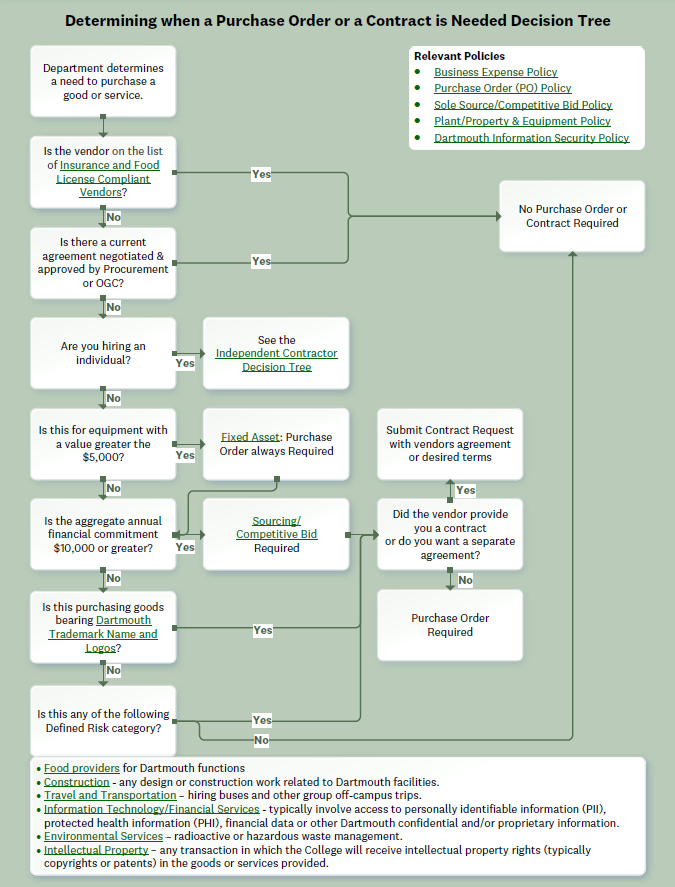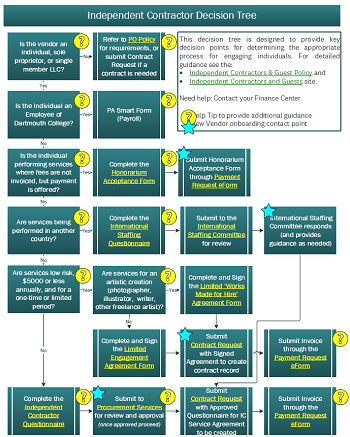Contract Management
The Procurement Contract Management System is a centralized system designed to increase the efficiency of contracting and contract management. Through standardization and automation, we increase processing speed, approval, transparency, and reporting and reduce individual and institutional risk.
Click here to see the Agiloft - Contract Management System Article in the ITC Service Portal
Need Help?
Contract Assistance email: Procurement.Services@dartmouth.edu
Technical Assistance email: Agiloft.Help@dartmouth.edu
Contract Management System
Access the Contract Management System or go to: dartgo.org/agiloftcms
📢LIVE TRAINING SESSIONS AVAILABLE!!
Introduction to the Contract Manage System Presentation (pdf)
Contract Management System Instructions
Contract Management System Video Training
Relevant Policies
Resources for Determining if you need a Contract
Watch: Clarifying the Role of Contracts and Purchase Orders in Procurement Transactions
Check out: Determining when a Purchase Order or a Contract is Needed Decision Tree
Contract Types
Agreements
- Events/Travel Agreements
- Procurement Goods and/or Services Agreement
- Service Agreement (Campus Services)
Master Agreements
Statement of Work (SOW)
Non-Disclosure Agreements (NDA)
Due Diligence
Relevant Policies
Contracting & Email
When working on Dartmouth business, such as negotiating a contract on behalf of Dartmouth, you must not use your personal email account. All email correspondence pertaining to official Dartmouth business must be done using your Dartmouth email account. Personal email accounts, such as Gmail or Yahoo!, must not be used when entering working on Dartmouth business.
Agreements
A separate form of agreement is used when the Dartmouth Standard Terms and Conditions referred to on a PO are not robust enough or are inapplicable to a transaction, and a Master Agreement is inappropriate. Suppliers may also request a stand-alone contract from Dartmouth. Common types of standalone contracts include vendor forms for software purchases such as Software License Agreements, Terms of Service, and Acceptable Use Policies, all of which define critical legal and commercial terms for the license and use of software; including service commitments and uptime guarantees.
Events/Travel Agreements
Event/Travel Agreements should be used when requesting agreements for an event and/or travel. Common types of agreements include Hotel Room Blocks, Conference Space, and Charter Bus Services.
Procurement Goods and/or Services Agreement
Procurement Goods and/or Services Agreements are one-off or standalone agreements for the purchase of goods and/or service that are not for events, travel, or campus service/facility goods or services.
Service Agreement (Campus Services)
Campus Services Agreements are one-off or standalone agreements involving the services and maintenance of Dartmouth owned or leased facilities.
Master Agreements
When Dartmouth and the Provider wish to enter into a broad relationship that will encompass numerous but separate projects, orders, purchase, engagements, etc., a Master Agreement can be used to establish the general terms that are intended to apply to all projects, orders, purchase, engagements, etc., (“Master Terms”). The terms and conditions set forth in the Dartmouth form of the Master Goods and Services Agreement parallel the Dartmouth Standard Terms and Conditions. Additionally, the Dartmouth form of Master Goods and Services Agreement includes additional language establishing the framework for subsequent SOWs (Statements/Scope of Work) between the Vendor and the Dartmouth Business Unit. Master Agreements with Vendors serving more than one Department/Division, which are intended to be institution-wide agreements, establish Master Terms that would impact other business units who are entering into a Statement of Work with Provider under the Master Services Agreement. For institutional Master Agreement, an individual with institutional authority/perspective should be the authorized signatory.
Master Campus Service Agreements
Master Campus Services Agreements are master agreements involving the services and maintenance of Dartmouth owned or leased facilities.
Master Procurement Goods and/or Services Agreement
Master Procurement Goods and/or Services Agreements are master agreements involving the purchase of goods and/or services not involving the purchase of services for Dartmouth owned or leased facilities.
Statement of Work (SOW)
A Statement of Work (SOW) Agreement is submitted referring to as a Master Services Agreement (MSA). The MSA is the governing document for the entire relationship, while the SOW deals with the specifics of a single project or scope of work. Each Statement of Work can establish terms which prevail over the Master Terms, if the specific transaction between the business unit and the vendor requires different terms.
Campus Services SOW
A Campus Services SOW is the statement of work referring to a Master Campus Services Agreement.
Procurement Goods and/or Services SOW
A Procurement Goods and/or Services SOW is a statement of work referring to a Master Procurement Goods and/or Services Agreement.
Non-Disclosure Agreements (NDA)
A non-disclosure agreement (NDA), also known as a confidentiality agreement (CA), confidential disclosure agreement (CDA), proprietary information agreement (PIA) or secrecy agreement (SA), is a legal contract or part of a contract between at least two parties that outlines confidential material, knowledge, or information that the parties wish to share with one another for certain purposes, but wish to restrict access.
Due Diligence
Contracting with an Individual through the Contract Management System
If you pay honoraria to visiting guests or hire individuals to perform services (such as lectures, performers, editors, or artists), you’ll want to review the new Independent Contractors and Guests policy, review the Hiring Independent Contractors & Guests site and Independent Contractor decision tree.
Types of Independent Contractors
- Honoraria are payments to guests where fees are not invoice, but payment is offered in appreciation of service. An honorarium payment may be any amount and is taxable income to the recipient. If the independent contractor meets the criteria to receive an honorarium payment, then:
-
- The Honorarium Acceptance Form can be completed, signed by the individual and then
- attached to a Payment Request eForm without any further action.
- Limited Engagements are defined as engagements with an independent contractor whom is performing services within the U.S. (excluding U.S. territories) over a limited period of time, where the total annual fee is $5,000 or less; and does not involve any high-risk services. If the engagement qualifies as a Limited Engagement, then the department, with the independent contractor completes and sign the Limited Engagement Agreement or the Limited ‘Works for Hire’ Agreement form, if the limited engagement is for an artistic creation (e.g. photography).
- Independent Contractors that do not qualify to receive an honorarium payment or within criteria of a limited engagement, would continue through the following Independent Contractor process.
Watch Hiring Individuals as Independent Contractors
Services outside the United States: If the individual will be working outside of the United States, the International Staffing Questionnaire must be completed and approved by the International Staffing Committee.
Services within the United States: If the individual will be working within the United States, the individual must submit a complete Independent Contractor Questionnaire (“Questionnaire”) to Procurement Services via email to procurement.services@dartmouth.edu. Upon submission, Procurement Services will review the Questionnaire and then make a determination about the individual’s status. Procurement will return the Questionnaire (with an “approved” or “denied” mark) to the individual, with a copy to the contacts identified on the Questionnaire. Approved individuals who are not yet registered in PaymentWorks will also receive an invitation to register in PaymentWorks.
Contracting
Once the individual is approved as an Independent Contractor, if a Dartmouth business unit is ready to engage the individual for services, a contract request should be submitted via the Procurement Contract Management System. A Requester or Submitter (if you are submitting on behalf of another person) can select any Agreement Type under the Master Agreement or one-time Agreement Record Types.
Step-by-step instructions to submit a contract request for an Independent Contractor:
- Log into Agiloft Contract Management System
- Click the link to Create a Contract. A blank Contract Record should display in your browser.
- At the top of the Contract Record, select “Master Agreement,” “SOW” (only if there is an existing Master Agreement with the Independent Contractor in the Contract management System), or “Agreement” as the Record Type, as applicable.
- In the Vendor Information section, when prompted, "Is the Vendor an Individual?" select "Yes."
- Next the end user will be prompted "Is work being performed in another country?"
- If "Yes", then the approved International Staffing Questionnaire must be attached to the Contract Record, in the indicated field, to demonstrate that the individual has be approved to perform services as an independent contractor in another country.
- If "No", then the approved Independent Contractor Questionnaire must be attached to
the Contract Record in the indicated field to demonstrate that the individual has
be approved to perform services as an Independent Contractor.
**NOTE: If a contract request is submitted for an Individual without the applicable approved International Staffing Form or Questionnaire attached, the Preliminary Approver or the Contract Manager may require the approved Form or Questionnaire, as applicable, be submitted before proceeding with the contract request.
- If the Vendor has registered in PaymentWorks or has a recent history of working with Dartmouth, there company information will be available via Oracle in the Contract Management System. Check if the individual is an “Existing Vendor.” If you do not find the vendor’s name, you can submit complete the contract request by providing the vendor information as a New Vendor.
- Complete all required fields as indicated by blue text and an asterisk (*) and then
click the “Submit” button at the bottom of the Contract Record to submit the contract
request.
**Note: If you need to save a draft of the Contract Record to collect required information, you can save the record in draft, by clicking the “Save Draft” button above the Record Type field, at the very top of the Contract Record. - Once submitted, the contract request will follow a preset Preliminary Approval/Notification
workflow depending on the funding type, as follows:
- For contracts that are marked as GL funded, the end user will provide the Chart String Org in the Funding section of the Contract Record. The system will identify who the Responsible Person for that Chart String Org and will prompt the end user to indicate if they would like to send the Preliminary Approval Request to a different authorized approver. If the end-user picks a different approver, then the Preliminary Approval Request email will route to that person, otherwise the Preliminary Approval Request will route to the Responsible Person for the Chart String Org.
- For contracts that are marked as Grant/Sponsored Research funded, the end user will provide the OGA award number in the Funding section of the Contract Record. The system will identify the Department Grant Manager, the Primary Investigator and the OSP Sponsored Research Manager. The Department Grant Manager will receive a Preliminary Approval Request email, and a notification that a contract request has been submitted will be sent to the Primary Investigator (PI) and to the OSP Sponsored Research Manager.
- For contracts that are marked as GL and Grant/Sponsored Research funded, all approval and notification workflows described in (a) and (b) above will apply.
- Once the contract request is preliminarily approved, the Contract Manager will review the details on the Contract Record. If all the required information has been provided, the Contract Manager will generate the Agreement form (either the standard Independent Contractor Services Agreement, a standard Services Agreement if the services require additional specific terms, a Master Agreement, or SOW if a Master Agreement is already on file).
- Once the agreement terms are finalized, final approval of the contract is routed by the Contract Manager via the Contract Management System to Required Approvers based on the Dartmouth Signature and Requisition Authority Policy. All contracts with individuals, regardless of the contract value, that are funded with grant/sponsored research funds are routed to and require approval of the Office of Sponsored Projects prior to execution of the agreement.
- Once all required approvals are obtained, the agreement can be signed by both parties. The Contract Manager will ensure that the final terms of the agreement are reflected in the Contract Record details and that a copy of the fully executed agreement is saved on the Contract Record.
Vendor Sourcing
Procurement guidelines have been established to promote competitive bidding. If the total value of the purchased goods/services will exceed $9,999, then it is required to obtain 3 quotes demonstrating that the vendor was the lowest bidder, or a Sole Source Justification form must be submitted. The Procurement Sole Source/Competitive Bid Policy outlines the requirements for competitive bids on goods and services purchased by Dartmouth College.
Conflict of Interest
The highest standards of business ethics and conduct should be applied by all Dartmouth employees in relations with suppliers. Dartmouth personnel should avoid situations that create or appear to create conflicts between their personal interests and Dartmouth's interests. All decisions made by Dartmouth Personnel in the course of their professional responsibilities are to be made solely on the basis of their desire to promote Dartmouth's best interests. If an individual's personal interests might lead an independent observer reasonably to question whether the individual's actions or decisions on Dartmouth's behalf are influenced by those personal interests, the individual should recuse himself or herself from the decision-making process and notify the responsible Dartmouth officials, as described in more detail in the Conflict of Interest Policy of Dartmouth College.
Data Security
When engaging any vendor for services, it is necessary to give thought and diligence to the type of information we are providing our vendors, either for person, financial, intellectual property, etc. The DISC Level refers to our Data Information Security as outlined in the Dartmouth Information Security Policy. Below are the definitions of the 4 levels:
- Level 0 - Data meant for public disclosure is defined as Level 0.
- Level 1 - Data with no confidentiality classification, but not intended for public disclosure, is considered Level 1 data. This is general business data for use within Dartmouth, and protected at a baseline level of control (available to the Dartmouth community via authenticated IT access, or authorized physical access to Dartmouth facilities).
- Level 2 - Data classified as level 2 are data which can only be shared with individuals deemed to have a 'need to know' as defined by the data owner.
- Level 3 - Data classified as level 3 are data classified as strictly confidential, requiring the highest level of sensitivity. This includes FERPA data, personally identifiable information (PII), personal health information (PHI), credit card information (PCI), among others.
Software Licenses & Maintenance Services
When considering the purchase of software, it is necessary for software vendors to follow the Dartmouth Information Security Policy (DISC Policy) and diligence requirements, prior to entering into agreement. See Information Security's Role in the Procurement Process.
- Data Security: Any system designed to store information about Dartmouth College or the Dartmouth community (Students, Faculty, Staff, Alumni, Associates, or Vendors), must provide Vendor Security Self Assessment, as well as, other data security documents depending on DISC level.
- Records Management: If the software will be storing Dartmouth College electronic documents and records, the Records Management Questionnaire should be submitted to Records.Management@dartmouth.edu.
Once approved, a Contract Request may be submitted using the Procurement Contract Management System. Any agreement type has the option for entering into an agreement for Software . Select the appropriate Master Service Agreement or Agreement from above and when prompted "Is this a software purchase?", select "Yes" and complete the required information and provide any required DISC documentation. If storing Dartmouth College documents and/or records, when prompted "Will the software store institutional information subject to Dartmouth Records Management document retention guidelines?", select "Yes" and upload the approved Records Management Questionnaire.
